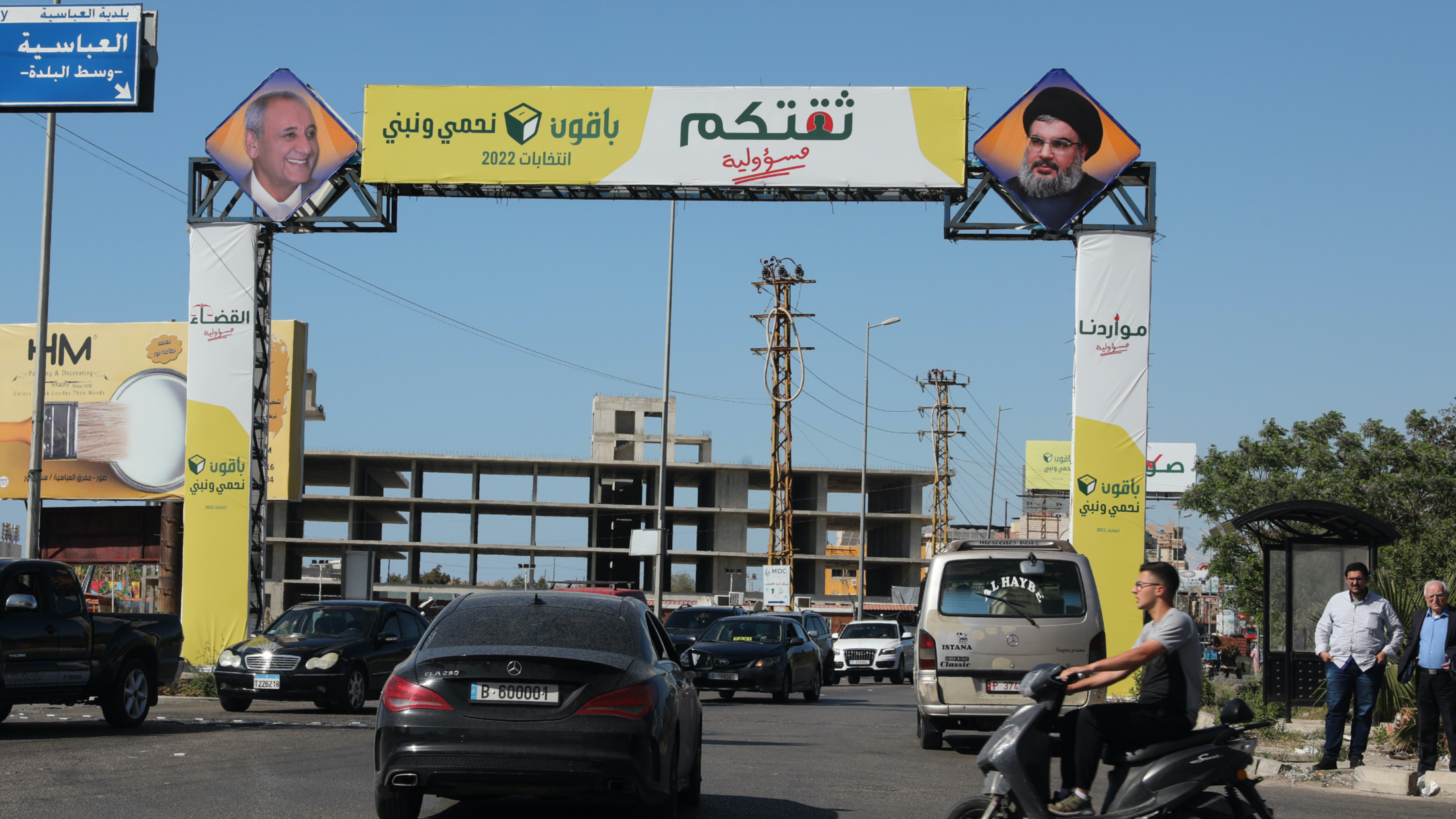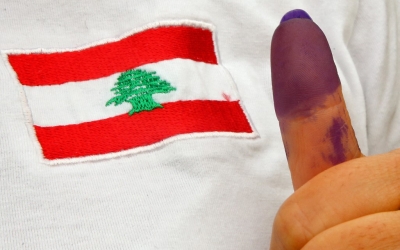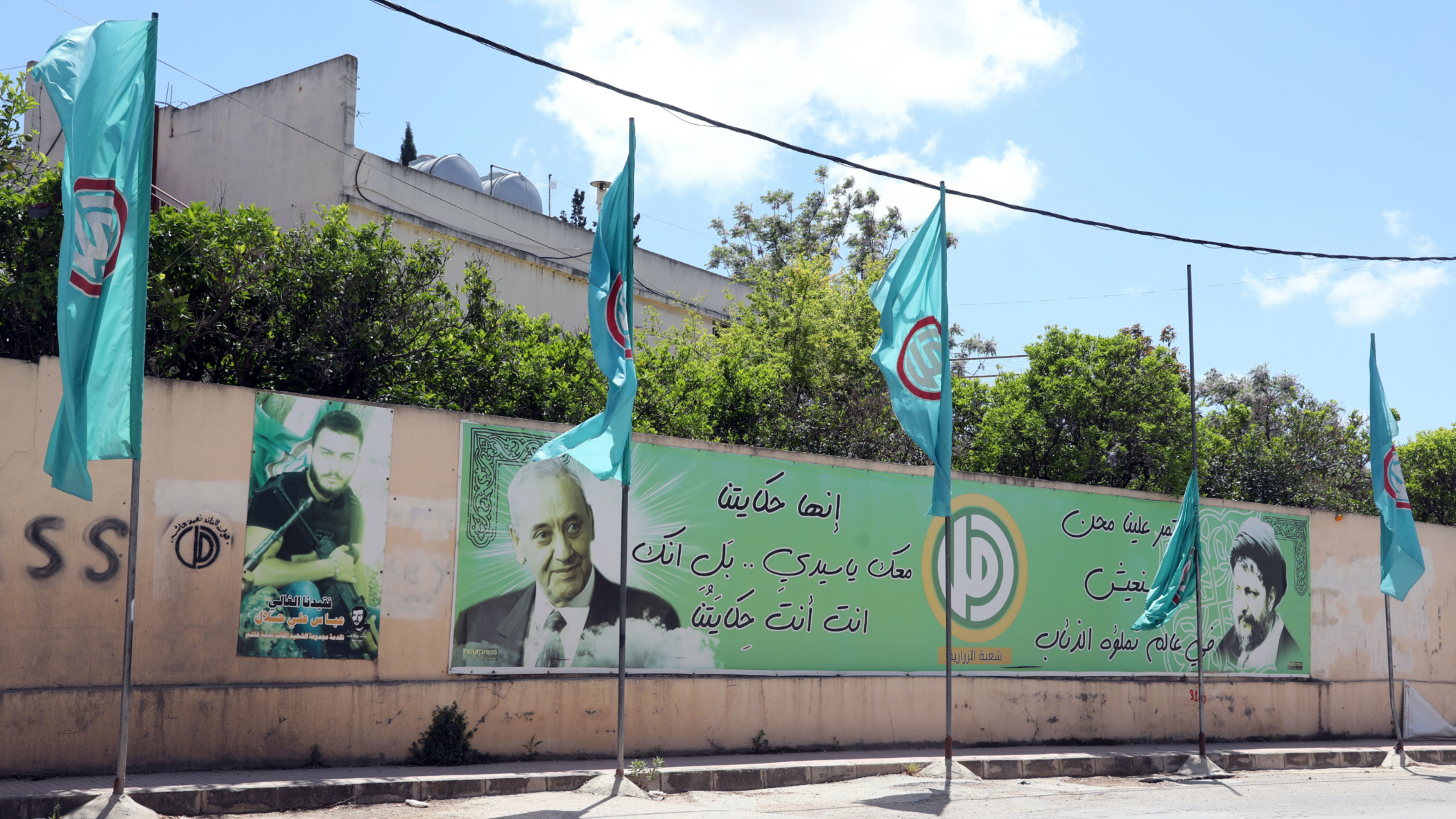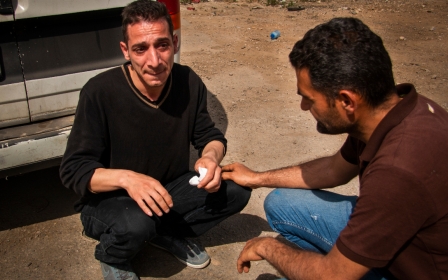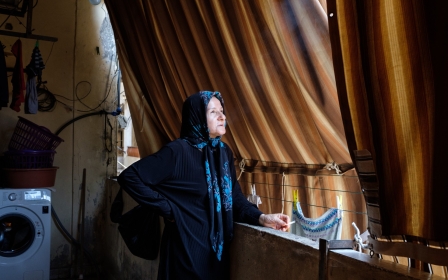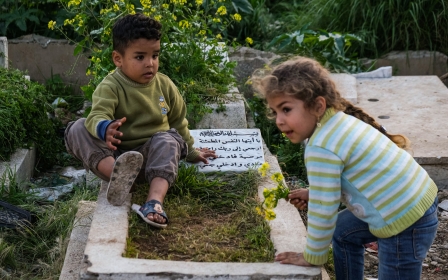Lebanon elections: Hezbollah and Amal court bitter and broke southerners
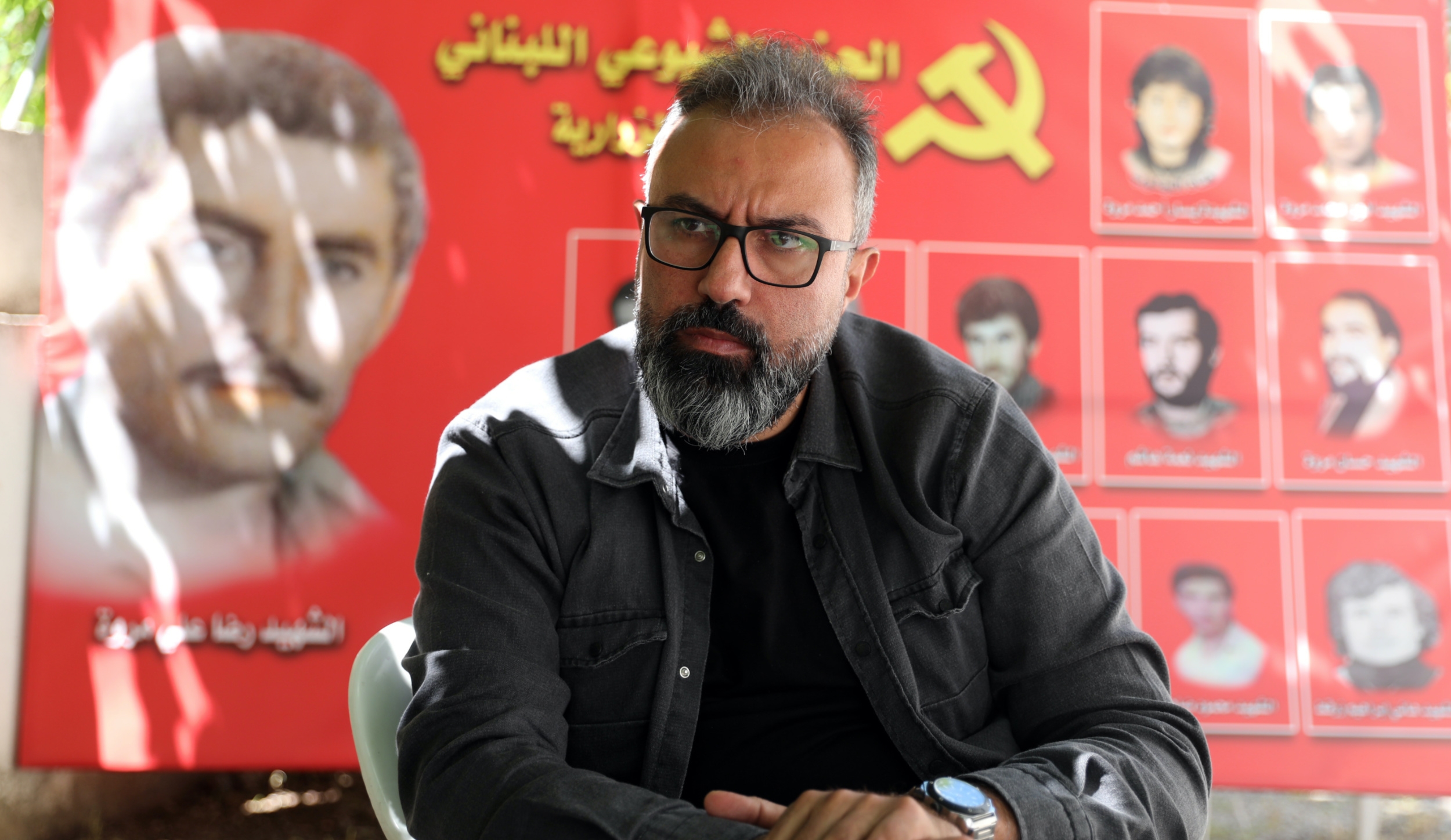
The electoral aesthetic across south Lebanon is a glaring display of the deep-rooted dominance of Hezbollah and the Amal Movement.
All along highways and side roads, the serene faces of Shia leaders and their candidates look on from posters as people drive deeper southward. “Your trust is our responsibility,” proclaims one slogan perched high at the entrance of Abbasiyeh, a town a handful of kilometres away from Lebanon's southern coast.
There’s no question that the Shia heavyweight parties are predicted to win the majority of votes in south Lebanon on Sunday. But a lot has changed in the four years since Lebanon’s last elections: a popular uprising and catastrophic economic collapse, to name a few.
That upheaval has led to rumblings of dissatisfaction across Hezbollah and Amal’s stronghold, and the parties themselves have taken notice.
New MEE newsletter: Jerusalem Dispatch
Sign up to get the latest insights and analysis on Israel-Palestine, alongside Turkey Unpacked and other MEE newsletters
Despite their assured electoral hold, for weeks now the parties have been contacting southern constituents - even those most loyal to them - to ensure that they will be voting on Sunday, in a push never seen previously.
But like all parties that make up the oligarchy that has run Lebanon into the ground, they are increasingly associated with the country’s breakdown, and many in the south have started expressing disenchantment with the factions they have traditionally supported and repeatedly voted for.
How that dissatisfaction is expressed is another matter. Lebanese voters have a habit of calling for change only to vote for their traditional parties when at the polling booth. Yet many southerners told Middle East Eye that faced with today’s corruption, stasis, and economic meltdown, they plan to boycott or cast blank ballots.
Meanwhile, independent candidates born of the 2019 anti-establishment protest movement are trying to win those dissenting minds - occasionally with violent results.
Selling coffee out of her sea breeze-swept van along Sour's Mediterranean corniche, Zeina cuts a resigned figure.
“I am 65 years old, I am tired, but still working because my university-educated children can’t find work,” she tells MEE, complaining the parties have turned their backs on her.
“I went from one official to another begging them to help my children find employment. I will not vote for anyone."
‘The audacity’
In the constituency of South III, which includes Nabatieh, Bint Jbeil, and Marjayoun-Hasbaya, Hezbollah and Amal’s list isn’t helping to detoxify the parties.
The choice of two candidates on their Hope and Loyalty list, former finance minister and senior Amal member Ali Hassan Khalil and Marwan Kheireddine, chairman of al-Mawarid Bank and a leader of the Druze Lebanese Democratic Party (LDP), has left many heads shaking.
Khalil, Amal leader Nabih Berri’s right-hand man, was finance minister between 2014-2020 and is seen as contributing to the economic collapse through corruption and mismanagement.
'It’s like adding insult to injury. People have lost their lifetime earnings, and still they put someone like Kheireddine on their list. It is shameful'
- Sarah, constituent
“Ali Hassan Khalil was responsible for the government’s financial decisions and oversight of the central bank, but instead of doing his job, he delegated all monetary policies to the bank’s corrupt governor Riad Salemeh,” Ali, a 33-year-old constituent of South III, tells MEE.
Months before the financial collapse, Khalil said Lebanon was not on the verge of bankruptcy and the central bank had robust precautions to ensure financial stability. Since then, the Lebanese currency has lost 80 percent of its value.
“The financial engineering that led to this economic disaster happened while he was in office,” Ali says, adding that he is still undecided between casting a blank vote or voting for Hezbollah and Amal's Hope and Loyalty list due to his “longtime support of the resistance” against Israel.
Many southerners, meanwhile, say that Hezbollah has promised to fight corruption but some believe they did not fight hard enough.
The real surprise, however, is the inclusion of Kheireddine.
As the economy unravelled in late 2019, Kheireddine’s al-Mawarid Bank was among the first banks that imposed capital controls and restrictions on depositors. Coupled with the steady collapse of the lira, the restrictions have meant that Lebanese were only allowed to withdraw small amounts from their accounts in local currency, while their savings steadily lost value.
In October 2021, documents leaked to the international media known as the Pandora Papers showed that Kheireddine, the brother-in-law of LDP head Talal Arslan, had set up a series of offshore businesses right before the crash. Media reports suggest Kheireddine was placed on the list as a compromise candidate between the parties and the Druze community.
“The audacity of having someone like Kheireddine on that list, after everything that we’ve been through in Lebanon. Nothing in the world should force Hezbollah into accepting this kind of candidate,” says Adam, a 36-year-old who has voted for Hezbollah in past elections. Like every other voter spoken to by MEE, Adam asked to be identified by a pseudonym for privacy reasons.
“I’m a hard-line resistance supporter, but this makes me really question if they have been part of the game of protecting the corrupt post-civil war political economy. They have no right,” he adds.
Adam, who is currently abroad, voted on Sunday along with the diaspora for the independents list, but not without trepidation.
“I barely know anything about the candidates and where they stand on many issues. I hope I didn’t vote for the wrong people just because I want to sanction the Shia political duo.”
Getting out the vote
In Beirut, Sarah, a Hezbollah supporter whose brother lost his savings in al-Mawarid, says she will abstain from voting in protest against these two candidates.
The 32-year-old was among demonstrators who protested on a daily basis in front of the Central Bank during the October 2019 uprising.
“It’s like adding insult to injury. People have lost their lifetime earnings, and still they put someone like Kheireddine on their list. It is shameful, even if they were forced to,” she tells MEE.
Sarah believes that Hezbollah has put their most ardent voters in a very difficult position, especially those who, “out of loyalty to the resistance”, will still vote for a list that includes candidates who have left them in ruins.
“The majority will still vote for the Hope and Loyalty list, but I wonder if it was worth it losing voters over someone like Kheireddine,” she says.
Discontent doesn’t necessarily translate into votes for independents, however.
Many southerners told MEE they are mistrustful of independent lists, unfamiliar with their programmes and what their candidates stand for, especially when it comes to Hezbollah’s weapons and whether the movement should keep them.
Hezbollah, which last fought a war with Israel in 2006, maintains that its arms in the country represent a deterrence force against future Israeli attacks.
The party has also acted as a social security blanket for its constituents, offering aid to struggling Lebanese in a country where state-level help is threadbare, at best.
Hassan, a voter in South III, has not forgotten this: “I’m voting for the resistance that has been there for us and protected us ever since I can remember. And when we were going hungry, had no electricity, medicine or milk, nobody stood by us except the resistance and its MPs.”
Hezbollah campaign coordinators are working overtime to remind people of those benefits, and attempt to draw a line between the party and the corrupt political elite that are increasingly loathed in Lebanon. Abstaining seems to be the greatest concern: The fewer people that vote, the lower the threshold for winning the seat becomes, widening the entry for independents.
“In order for us to protect people, give them back the money that was stolen after more than two years of economic siege, and maintain the deterrence weapons against Israel, we need to have a strong political presence through our MPs in parliament,” one Hezbollah campaign organiser tells MEE, speaking on condition of anonymity.
Middle East Eye has reached out to Hezbollah and Amal candidates but they declined to comment.
‘Who will defend us?’
In Nabatieh, flagpoles stand heavy with Amal banners, and the face of Berri, who has been parliament speaker since 1992, is brandished over almost every wall.
Yet in 2019, the town was the scene of one of the more significant anti-establishment protests.
Mariam, 40, says any hope for real change she felt during the uprising vanished when the demonstrations she took part in were violently suppressed by Amal and Hezbollah supporters.
“Look what has become of us,” she says, gesturing at her empty electronic store in Kfar Remen, just northeast of Nabatieh. “I will not vote, why would I? Whether or not I do, the same faces will inevitably come.”
“We don’t even want to give independents a chance. They are all the same and we’ve only ever been disappointed,” she adds.
Eight kilometres away in the village of Doueir, speaking consciously out of earshot of bystanders, Ibrahim, 60, echoed Mariam’s doubts over opposition candidates in the south and the ruling politicians.
“I plan to submit a blank vote. I am wary of the independents list, I don’t know who they are. Some are accused of having foreign agendas - how can we be sure?” Ibrahim tells MEE.
“Many of these independent candidates only talk about disarming Hezbollah, as if that’s the only thing of substance to highlight.
“The lira has collapsed, we neither have dollars, water, nor electricity - what are they planning to do about all of that? And I am not saying I support Hezbollah, but who will defend us if Israel attacked?”
Independent challenge
Ayman Mroueh, candidate for the opposition list Together Towards Change in South II, which includes Sour and Zahrani districts, says that while some candidates are calling for Hezbollah’s disarmament, the same cannot be said for others.
“They [Hezbollah and Amal] are using this issue as a tool to pressure people to vote for them, or else they are branded as traitors,” he tells MEE.
“They accuse you of being against the resistance, but that’s not true. I represent the Communist Party, which was the first party to launch a national resistance.”
Mroueh believes distrust towards the opposition is based on the decades-old corruption of “the governing mafia”.
“Their practices have made them feel that no change is possible in this country. People’s first inclination is not to vote or to cast a blank vote, and while that’s a position in itself, it is still one taken from frustration rather than enthusiasm for change,” Mroueh tells MEE in the headquarters of the Communist Party in the town of Zrariyeh.
Another factor, he says, has been the lack of media exposure. In Lebanon, candidates have to pay media outlets to be interviewed during elections campaigns. According to Mroueh, TV appearances can cost between $5,000 and $30,000.
Even social media is a difficult battleground. Some of Mroueh's videos online have been taken down after getting mass reported by what he calls “the authority’s electronic armies”.
“A lot of people don’t know us. Some mistake one list for another and don’t know who the candidates are and what they are saying,” he says.
'They need to understand that if we elect the same people it’s akin to taking the decision to point their gun to our own heads'
- Ayman Mroueh, independent candidate
Mroueh was among a number of Together Towards Change candidates who were attacked last month, reportedly by Amal and Hezbollah supporters, while on their way to launch their programme in the village of Sarafand.
“They blocked the road, threw rocks at us as they shouted ‘this is Nabih Berri’s land’,” Mroueh recalls. “The paradox is that these people know their parties are corrupt and have ruined their lives, yet they believe that salvation can only come through them.”
Still, Mroueh says there’s a tangible change in the popular mood in the south, but it’s still early stages.
“People are being humiliated in front of gas stations, pharmacies, and shops. They need to understand that if we elect the same people it’s akin to taking the decision to point their gun to our own heads,” he says.
“They might not have reached the stage where they would vote for people calling for change, but at the minimum, the level of voting for the ruling authority will decrease and that is a victory.”
This article is available in French on Middle East Eye French edition.
Middle East Eye delivers independent and unrivalled coverage and analysis of the Middle East, North Africa and beyond. To learn more about republishing this content and the associated fees, please fill out this form. More about MEE can be found here.


